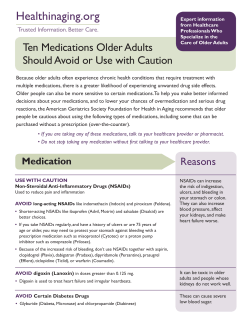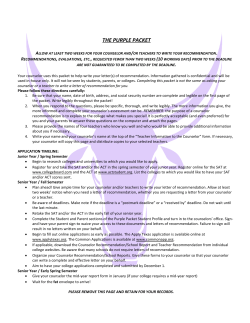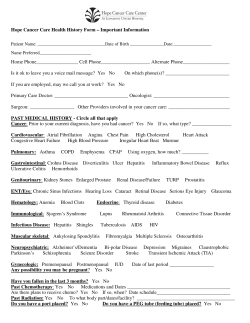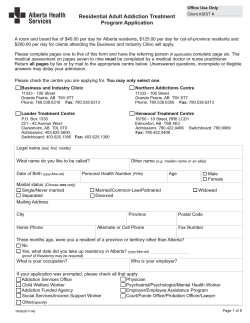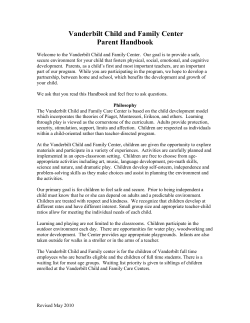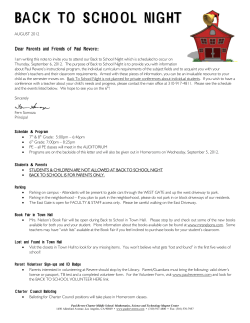
De Paul Information Packet De Paul Youth and Family Center
De Paul Information Packet De Paul Youth and Family Center 4310 NE Killingsworth St. Portland, OR 97218 503-535-1181 Jenna Napier Alexcia Lizarraga Rick Vaughan Admissions Supervisor Client Services Specialist Admissions Counselor 503-535-1186 503-535-1150 x1258 503-535-1150 x1140 Revised 5/3/13 1 Welcome to De Paul Youth and Family Center! De Paul’s Residential and Outpatient programs provide evidence-based treatment in a safe, structured and welcoming environment. Your child will participate in a variety of group, individual and family therapies that focus on drug and alcohol education, life skills, mental health and recovery maintenance. Our programs provide your child with the opportunity for personal reflection, growth, education and recovery. Our Treatment Philosophy Addiction is a chronic disease that is treatable. Our approach is strength-based, supporting youth in developing a sense of competence, usefulness, belonging and empowerment. Every aspect of our program is aimed to provide your child with the tools necessary to cope with emotions, develop supportive relationships, and prevent relapse. At De Paul, we want to help your child embrace recovery. De Paul’s Core Values Love Respect Humility Integrity Courage Creativity Faith Trust Unity Revised 5/3/13 2 Residential Care De Paul’s Residential Program provides 24 hour supervision. Clients will experience a supportive living environment that works at developing communication and leadership skills, self advocacy and teamwork. This program can house up to 40 youth ages 13 to 19. De Paul’s Youth & Family Center offers services that are based on the field of Positive Youth Development (PYD). PYD is an evidence-based philosophy that emphasizes providing services and opportunities that support all young people in developing a sense of competence, usefulness, belonging and empowerment. The goal of the PYD approach is to ensure that all adolescents experience this life stage positively. • Therapy- Each client is assigned a treatment team which consists of a family counselor, an individual counselor and a milieu counselor. This team will work with the youth and their family to design and implement an individualized plan that will lead to healthy decisions and a successful graduation. • Education-During part of the day, clients will attend the on-site De Paul Alternative High School. De Paul Alternative is accredited by the Portland Public School system and offers a balance of individualized study and direct group instruction for those seeking a high school diploma or G.E.D. • Groups- Clients participate in individual counseling, family counseling and group counseling. The groups focus primarily on Dialectical Behavioral Therapy and Alcohol & Drug Education. We also offer in house as well as offsite AA/NA meetings. • Community- Clients will have the opportunity to engage in off-site activities. Some offsite activities might include the Oregon Humane Society, the Tree Farm and other fun activities like swimming, hiking and going out to the movies! These community focused groups give the clients the chance to experience fun sober living. • Health- Here at De Paul we believe that an important aspect of sober living includes a healthy active lifestyle. To support that lifestyle, De Paul employs Medical, Nutritional and Fitness staff to support your youth while Revised 5/3/13 3 they discover a new way of living. Our clients are provided medical support, including medication management, 3 healthy meals plus snacks each day, prepared on site, and a health coach to assist the clients while they use our new weight room! De Paul Alternative High School At De Paul, we believe that education is a part of treatment. Intellectual growth and critical thinking skills are key elements in young people’s sustained sobriety and provide them with the foundation to become life long learners. De Paul’s Alternative High School was established in 1990 and is accredited by the Portland Public School system. The school’s curriculum is creatively designed to inspire confidence in learning. We are committed to providing a challenging learning environment for all youth regardless of educational history. Clients attend school for 3 hours per day. Classes consist of: -Math -Language Arts -Social Studies Each student must choose one of the following as an elective: -Art -Astronomy -Fitness Students will be enrolled at De Paul Alternative school and will receive credit for work completed. When the client leaves De Paul, their credits earned will go with them to their next school. According to Oregon Department of Education standards, students must score a 236 in reading and math to meet the high school standard. On this scale, five point increments equal one grade level. Here is a breakdown of how De Paul students have improved, year by year: 2007-2008 2008-2009 2009-2010 Average gain in Reading 4.77 points 5.30 points 5.44 points Average gain in Math 4.69 points 7.15 points 6.14 points Revised 5/3/13 4 Outpatient and Intensive Outpatient Services This program is designed for either someone just beginning their journey through recovery or for those transitioning out of residential care. • Therapy-Each client is assigned a treatment team which consists of a family counselor and an individual counselor. This team will work with the youth and the family to design a successful plan that will lead to the road of clean and healthy living. • While enrolled in OP or IOP the youth will attend 1 individual counseling session, 1 family counseling session and 1 to 5 treatment groups per week. Groups are offered Monday through Thursday and include: o DBT (Dialectical Behavioral Therapy)-Clients will develops skills in emotional and behavioral regulation and increase awareness of emotional and behavioral patterns. o Early Recovery Skills- A group that focuses on navigating the challenges of being newly sober. Education about the biological basis of addiction and recovery. o Relapse Prevention- A group for those further along in recovery. Focuses on building a sober community and personal recovery. o Skillstreaming- Focuses on social and problem-solving skills. Develops competence in dealing with conflict and practicing self-control. o Sober Journeys- A group for those who have left the De Paul Residential program. This is a client-guided group focusing on life after Residential. o Support Systems-Identifies how family, friends and neighbors can enhance the recovery process. Reinforces the characteristics of healthy and supportive relationships. o In-House AA Meeting (free of charge)-Closed meeting offered by Portland’s Young People in AA. The groups consist of anywhere from a few to 15 teens that have the opportunity to openly discuss their experiences and to gain support from peers who are working the program. Revised 5/3/13 5 Our Family Program employs Masters level family counselors with expertise in drug and alcohol abuse. Our mission is to support families towards healing and recovery. Studies show that youth experience greater levels of success when family members and those actively involved in the youth’s life engage in supportive roles through the treatment process. Family therapy is a cornerstone to the services we provide at De Paul. That is why we offer treatment that includes the family through comprehensive therapy and parent coaching services. Each family is assigned a Family Counselor. Family therapy is used to: • • • • • • Work through communication problems Create healthy family rules and safety in the home Support overwhelmed parents Support couples Uncover habitual patterns that keep families stuck in negativity Make use of the many strengths within the family We know that when one family member has a substance abuse problem, the entire family is affected. We thank you for your involvement in your youth’s recovery and thank you allowing us to join and support you on this path of recovery! Family involvement in treatment activities is strongly recommended. Getting Started! Before your youth enters De Paul we will need to begin with a Drug and Alcohol Assessment. This assessment looks at the client's use, and will also include questions about family history, home environment, other supports, mental health, legal and behavioral concerns, and school. The appointment can take anywhere from 2 to 3 hours. The evaluation portion of the assessment will be done with the youth and family separate and then everyone will come together and discuss recommendations and future plans. Revised 5/3/13 6 When you come to the assessment please bring with you: o All Insurance Cards (medications cannot be re-filled later if these are not provided at time of intake) o Birth Certificate o Photo ID o Social Security Card Additional items for residential program clients: o 30 day supply of prescription medications (clients may be denied admit if they have less than 2 week supply of medications) o Immunization records o Transcripts o Any school related assessment (IEP or 504 plans) It is important to arrive on time. Please come prepared to pay the amount quoted to you by our Admissions Department or your insurance provider. Insurance, fees, and funding During the assessment you will meet with our Client Services Specialist to discuss fees and payment for services. If you are a private insurance client, please provide insurance information prior to the assessment. This will allow our Client Services Specialist to determine your benefits and prepare payment options to you. Please be prepared to pay any deductible or co-pay/co-insurance due. ** If a client/client’s family has Kaiser please contact Kaiser member services directly and make a request for referral to De Paul Treatment Centers. Revised 5/3/13 7 If you are paying for services yourself: In order to properly assess financial information and to place you on our sliding scale we will need a few things from you. These items are especially important if you are applying for reduced fees or state funding: o Last 2 paycheck stubs of all people working in the household over the age of 16. OR o Last year’s tax returns of all people working in the household over the age of 16 that are currently in the home. If you are currently unemployed please bring documentation from your local unemployment office stating that you are unemployed and proof of unemployment. If you have no cash flow please be able to explain how you are existing. If you are receiving income from anywhere other than working wages (financial aid, child support, SSA or SSI, etc.) please provide copies of award letters. Packing information: Clothing: Please bring only one week’s worth of clothing. Bring appropriate clothes for the season, swimming, gym, outdoor recreation. No gang attire (colors) or sagging pants. No advertising of drugs, drug use, violence, or discrimination of any kind. No short shorts, skirts, micro tops, spaghetti strap tank tops, tight-fitting or revealing clothing items. Bedding: Revised 5/3/13 8 Bedding and pillows are provided but you may bring bedding and a pillow if they are new and un-opened. No bedding is allowed from home or out of packaging. Personal Grooming & Hygiene: Hairspray (non-aerosol), hair gel, toothpaste, shampoo, deodorant, lotion, cologne and perfume (non-aerosol), make-up, combs, brushes, and hair straighteners are allowed. Products containing alcohol in the first three ingredients are not allowed. Clients may bring electric razors, although De Paul supplies disposable razors to clients. No glass of any kind is allowed. Medications: ALL MEDICATIONS MUST BE APPROVED BY DE PAUL as there are some we do not allow. If you are taking prescription medications please bring a 30-day supply of each with you to treatment. Over-the-counter medication or vitamins will not be allowed without a doctor order/script. If you have any questions about medication please feel free to call 503-535-1181. Notify Admissions ahead of arrival if youth is taking any controlled medications like stimulant ADHD medications. These medications will need to be re-filled by parents and brought to youth in treatment as this is not a medication we can typically prescribe. Nicotine/Tobacco: De Paul is a smoke free zone. Cigarettes, chew, or other forms of consumable nicotine is not permitted. Patches are allowed but must be approved by parents (by signing a consent) at intake. Not all insurances will cover the patch, so it is recommended that parents bring these at time of intake to ensure that their child can get one right away. These must be sealed (unopened) to be approved. You make bring appropriate reading material and a personal CD or MP3/Ipod nano player (no internet capabilities) to use during your free time. Ipods with data other than music will be wiped of their data if they are to be used during treatment here. It is recommended that you upload any important information Revised 5/3/13 9 into a computer or other device prior to admit, such as photos or videos that you wish to keep. Prohibited Items: Condoms, bandanas, or eye drops. Items that have been removed and placed in you personal belonging box. Permanent or dry-erase markers, including sharpies. Nutritional supplements or food products of any kind. Anything that produces heat or flame, or is flammable, including but not limited to candles, incense, fireworks, matches, or lighters. Electronics including but not limited to radios, TV’s, cell phones, pagers, electric toothbrushes, or extension cords. Anything that connects to the internet or is capable of audio and/or visual recording. De Paul computers available in the dorm or school may not be used for email or social networking sites such as Facebook. Glass items, including but not limited to mirrors and framed pictures. Glue, liquid bleach, and aerosol containers of any kind. Items that are gang-related, including colors, or items that display images or themes that are racist, sexist, homophobic, or belittling of any individual or group, including self-drawn pictures. Any picture or image of human beings that doesn’t meet the De Paul dress code, including self-drawn images. CLIENT BELONGINGS LOG / INVENTORY COATS/JACKET (4 maximum limit) SHOES (4 maximum limit) 1. 1. 2. 2. 3. 3. 4. 4. PANTS/SHORTS (10 maximum limit) SHIRTS/SWEATERS (10 maximum limit) 1. 1. 2. 2. 3. 3. 4. 4. Revised 5/3/13 10 5. 5. 6. 6. 7. 7. 8. 8. 9. 9. 10. 10. UNDERWEAR / UNDERGARMENTS(12 limit) SOCKS (10 maximum limit) 1. 1. 2. 2. 3. 3. 4. 4. 5. 5. 6. 6. 7. 7. 8. 8. 9. 9. 10. 10. 11. MISCELLANEOUS 12. 1. HYGIENE PRODUCTS 2. 1. 3. 2. 4. 3. 5. 4. 6. Revised 5/3/13 11 5. 6. 7. 8. 9. 10. Medication/Medical Care De Paul Youth and Family center has a medical department on site. The current personnel consist of a psychiatric nurse practitioner and a nurse practitioner who are available one day a week on site and Monday through Friday by phone. Full, extensive psychiatric exams are facilitated by the psychiatric nurse practitioner when deemed necessary. The general nurse practitioner provides limited physical exams, gives TB vaccines, and triages clients to further access their need for outside services. It is our desire that parents be actively involved in their children’s health care and, when possible, make appointments and provide transportation. We request that when you make a dentist or doctor appointment, you notify the Milieu Counselor Supervisor (503-535-1150 x 1141), immediately to provide the date and time of the appointment. These appointments will be placed on the calendar so that staff is aware and can plan accordingly. We suggest that parents consult with staff prior to scheduling outside appointments in order to limit disruptions of the residential treatment. Clients are not allowed to have narcotics while in treatment. In most cases, an increased dose of Ibuprofen (600 mg-800 mg) is sufficient when a client Revised 5/3/13 12 needs a pain medication. If there are surgeries of any kind and the physician/dentist determines the client needs a narcotic for pain, please advise De Paul in advance so arrangements can be made for the client to go home on a medical pass. Some clients are on medical health medications. These medications are prescribed for mood, anxiety and ability to focus. In general: • • • • • • Clients should take medications daily, even on passes. Stopping and starting medications may cause a headache or an upset stomach. Talk to the nurse practitioner before stopping any medication. This will ensure a smooth transition. Feeling happy doesn’t mean medication can be skipped for that day. Deterioration from disuse may not occur for several weeks. In teenagers, depression and anxiety may look like other things: − Irritability − Fatigue − Excessive sleeping − Lack of interest in anything Check with your child’s residential or family counselor before making any changes in your child’s medication schedule. Signs of Withdrawal: It takes awhile for your body to detox. This can often be a painful experience, marked by: headaches, diarrhea, vomiting, body aches, nausea, body temperature fluctuations. Please keep staff updated on how you're feeling. It is important that, during this time, you drink plenty of water to help your body flush out toxins. Nicotine Patches: It is very difficult to quit smoking. Based on how many cigarettes you smoke per day, you may be eligible for a nicotine patch. You will be on one dose for 2 Revised 5/3/13 13 weeks, receiving it in the morning and then returning it before bed. After 2 weeks, you either move down a dosage or stop receiving them. Bottom Line Expectations A clean, sober and drug/alcohol/tobacco-free environment A safe and violence-free environment An environment that does not permit sexual activity An environment that expects cooperation with staff requests and direction. Definitions: No Drugs - Clients may not use or be under the influence, or be in possession of drugs, alcohol, or tobacco. No Violence - Clients may not act violently towards themselves (self harm), property, or others. Clients may not engage in behaviors that are threatening, intimidating, or cause safety risks to themselves or others. No Sex - Clients may not engage in any sexual activity with other youth in treatment, including physical affection and romantic relationships. No Prohibited Items - Condoms, bandanas, eye drops, markers, food, flammables, unapproved electronics (including those with internet and/or recording capabilities), glass items, glue, bleach, aerosol containers, any items that display images or themes that are racist, sexist, homophobic, or belittling of any individual or group, any items that are gang-related. Interventions If staff identifies a problematic behavior they will first clarify expectations and ask for cooperation, this is known as a Redirection. If cooperation is received then the redirection is over. If cooperation to redirections is not received, the client is informed that they are on ReFocus Status for 72 hours. Revised 5/3/13 14 If problematic behavior continues while on re-focus status, the client may be placed on a Suspension Status for 72 hours. Staff will inform parents and those in treatment planning at each of these steps and may be able to facilitate a clarification meeting to address concerns together. If lack of cooperation with rules and redirections continues, the client may be discharged from treatment. Students may be discharged suddenly If a child behaves in a way that warrants discharge we will call you immediately to arrange pick up. For safety reasons, there are some behaviors that are not tolerated on campus and may lead to immediate discharge: • • • Violence toward peers or staff Bringing drugs, alcohol, or weapons onto the campus Sexual relations with peers Your child has more than one counselor. Who do you contact? Your participation in your youth’s treatment is essential. We encourage you to call your family counselor or your child’s residential counselor with any concerns or questions. Family counselors may be easier to reach and may be able to return your call more quickly. Contacting your child by phone. Because De Paul protects the confidentiality of all clients, the dorms are not allowed incoming calls. When you call, you may leave a message; however, De Paul employees can not acknowledge that they know your child, nor can they confirm or deny that your child is here. Again, this is for the protection of your child and your families’ confidentiality. Questions about this procedure can be addressed with your child’s family or residential counselor. During business hours, messages can be left by calling 503-535-1181. After business hours, phone calls are directed to the dormitories, and the same procedure applies. Be Revised 5/3/13 15 aware that there are times after hours when all staff are away from the dorms with the youth doing activities; at that time messages may be left by voicemail. In cases of extreme emergency, explain your situation to the De Paul employee so that they may find a way to support you and connect you to the counselor or to your child. The best way to speak with your child by phone is to arrange to be available for his/her outgoing phone calls. Your child has specific days during which he/she will be allowed to call, typically in the evenings or during the weekend. Please discuss this with your child; if necessary contact your family counselor or your child’s residential counselor for clarification. Phone calls are made between 6:30pm – 9:00pm Each call can last up to 10 minutes Clients can only call those numbers and persons on their list which has been approved by their primary and family counselors. Clients can use awarded Kudos for additional phones calls once all other phone calls have been made. Family Visitation Schedule Boys Dorm GROUP 1 - Wednesdays 7-8:30 pm & Saturday 10 am – 12 pm GROUP 2 - Thursday 7-8:30 pm & Sunday 10 am – 12pm Girls Dorm GROUP 1 - Tuesday 7-8:30 pm Revised 5/3/13 16 & Saturday 10 am – 12 pm GROUP 2 - Wednesday 7-8:30 pm & Sunday 10am – 12pm * Parent/Family, please leave contraband items, such as weapons, nicotine, etc. in your vehicle. * Any items brought for clients must be checked in by staff. All visitors must be approved ahead of time through staff with a signed release of information on file that is also signed and approved by the parent/guardian. THERAPEUTIC OFF-SITES Clients may become eligible for home passes or "therapeutic off-sites" after reaching the “Leadership Level” in treatment. Eligibility requirements include completion of all treatment work, academic work, family treatment plans, and compliance with De Paul rules. Clients can earn progressive off-sites during their treatment episode, starting with 4-6 and going up to 12 hours and then to 24 or 48 hours. We will assess whether the student is ready to have longer passes based on family therapy/involvement, success of previous off-sites, and determined goals of the requested therapeutic off-sites. Therapeutic off-sites must be taken on the weekends, unless prior arrangements have been worked out between the client, the family counselor, and the residential counselor. Clients may not go on therapeutic off-sites if they are on a status related to behavioral or treatment concerns. FAMILY GUIDELINES Family Guidelines (listed below) are established before the client leaves for the first pass. Guardians and youth review the Family Guidelines with their family counselor prior to each pass. All individuals are expected to follow the guidelines while on pass. Parents are to bring clients back to the facility at any time that the pass guidelines are not being honored. • • Full supervision, sight and sound. Clean and sober environment (no exposure to alcohol or other drugs). Revised 5/3/13 17 • • • • Structured time with family and authorized support persons only. Clients are expected to follow treatment guidelines while off site. De Paul does not allow use of nicotine or caffeine products. Clients will only be assisted with nicotine cessation once while in treatment. Clients should have no exposure and/or use of nicotine and caffeine products while off site. It is a fact that withdrawal from these substances interferes with re-engagement in treatment. Please do not return youth to the facility smelling like cigarettes. A family therapy session must be completed before a client can go on a therapeutic off-site to go over expectations while off site. Returning Late From a Therapeutic Off-Site Clients returning late are expected to call De Paul (we accept collect calls) and inform staff before the hour of the expected return. If the youth is between 15 minutes and up to one hour late, he/she may lose privileges and time off the next therapeutic off-site or may result in a status. For every additional hour late, youth lose two more hours off his/her next therapeutic off-site and may result in a status. If youth is late and fails to call, he/she loses the entire next therapeutic off-site and may result in a status. Repeated failure to return on time will be taken seriously and individual consequences will be decided by the youth’s treatment team. Admissions FAQ What kind of services do you offer at De Paul Youth and Family? De Paul is a dual diagnosis alcohol and drug treatment center. What that means is we offer alcohol and drug treatment as the primary focus while also being licensed to attend to some mental health needs as they commonly accompany substance abuse disorders. We serve clients between age 13 and 19, however most fall between the ages of 15 to 17. We offer a range of services including alcohol and drug assessments to determine the appropriate level of care for each client: outpatient and intensive outpatient treatment, as well as residential treatment. We also offer family therapy services for individuals and families who are not enrolled in our other programs but who have substance abuse issues in their families and need support. Any configuration of the family and supportive friends are welcome to attend these services. All of our treatment services include individual counseling, group counseling and family therapy. Our programs are all self-paced, and are driven by our strength based, evidence based practices. Due to the individuality of each client and family that we serve, treatment may be shorter or longer based on the goals and needs of each person we serve. The average residential stay is roughly 60 days, and the short-stay program has an Revised 5/3/13 18 average length of stay of 40 days. The length of your stay will depend on many factors that are difficult to anticipate prior to admission, including insurance authorization. __________________________________________________________________________ ** If a client/client’s family has Kaiser please contact Kaiser member services directly and make a request for referral to De Paul Treatment Centers. **Unfortunately De Paul does not offer detox services for youth at this time. We would suggest you talk to your primary physician if a detox period is necessary. If you do not have a primary physician you should go to a local hospital. Program Specific Information RESIDENTIAL: We are not a locked facility. We encourage clients to talk to staff and other peers when and if they feel the urge to leave treatment prior to completion of the program. If a client does happen to choose to leave we will notify both their emergency contact and file a run report with the police immediately if that client is under 18. If 18 or over, we will call the emergency contact. “Runs” from the program are rare, only 5% of our clients “run”. We have both a male dorm and a female dorm. The dorms are housed separately but clients may attend some groups and school classes. Clients have 24 hour supervision. There is never a time when there is not staff available. Our program is very structured with the clients waking up every day at 7:30 and having full days including groups, school, individual and family sessions and outside activities until they go to sleep at 9:30/10:00 every night. Each client is assigned a primary counselor and a family counselor whom they meet with weekly for therapy sessions. These counselors are also the primary contacts for families and referents once enrolled in our programs. On our staff we have a nurse practitioner and a psychiatric nurse practitioner to provide health and mental health services. They are able to complete psychiatric evaluations and prescribe as needed. Revised 5/3/13 19 While in residential treatment clients attend our alternative high school which is accredited through Portland Public Schools. GED preparation help to facilitate GED testing may be an option for some 17 and older students if they are extremely credit deficient. If a client has already earned a GED or Diploma they can work on getting into/taking college course or another independent project, but they must still attend school while at the youth Residential program.. While in treatment clients will often go on hikes, go to yoga, sporting events or other activities off campus. Revised 5/3/13 20
© Copyright 2025



